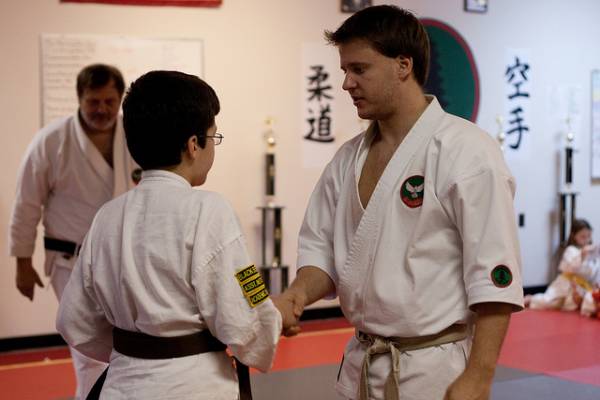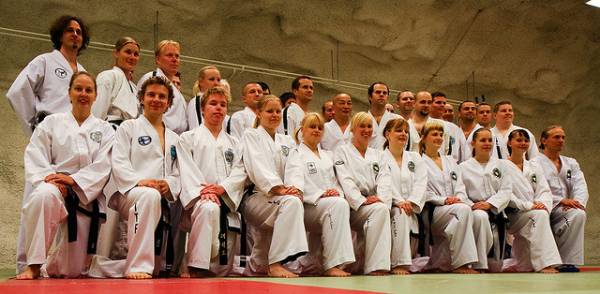When awarded his fifth degree black belt at the age of 81, Willie Nelson said, “I think martial arts is one of the best exercises you can do. Mentally, spiritually, physically, everything.” His achievement is especially interesting because he started training in his sixties.
When awarded his fifth degree black belt at the age of 81, Willie Nelson said, “I think martial arts is one of the best exercises you can do. Mentally, spiritually, physically, everything.” His achievement is especially interesting because he started training in his sixties.
Passing the black belt test is an experience any martial artist will remember for a lifetime. The highest color belt awarded in many martial arts grading systems, your black belt does not turn you into a Zen-spouting superhero, but the process is transformative and rewarding.
Having just earned my own black belt at the age of 45, here are six lessons learned from my years of training and from the wisdom and patience of my instructors (Wil Dorsett and Troy Champney of The Edge Martial Arts and Tumbling) that perhaps can enhance and inform your own black belt journey.
1. It’s Up to You
Maybe you chose your martial art to learn self defense, get in shape, compete in tournaments, or discover yourself. Whatever your motivations, while your coach/sifu/sensei will show you the path, he or she cannot walk the road for you. Sure, life sometimes happens and you might have to miss a practice.
Family, job, and other responsibilities pull you in different directions. You get sick and injured. You don’t want to miss the game on television. Simply put, life throws you many excuses not to train, but it’s up to you to make it work.
Have to go out of town on travel? Arrange with your coach to review material in a private session or practice on your own. At home with an illness? Fine, no one wants your dojo to be shut down because of a typhoid outbreak. Injured?
You can still show up and watch or participate as best you can. Want to watch television?
While I understand the temptation, especially on those sultry summer days when the cookouts stretch late into the night or when it’s storming outside and the couch is soft and comfortable, just remember that the responsibility for your advancement, or lack thereof, rests alone on your shoulders.
2. Be in It for the Long Term
They say the journey of a thousand miles begins with a single step. You began your martial arts adventure by showing up to practice that first day. Now you have to survive to the end. I don’t mean survive as in not be killed – hopefully the martial art you chose is not that hardcore.
But the road to black belt is in some sense a journey of attrition. Many who started training when you did will not be there when you take your black belt test. Though things can happen that cause you to quit your training, chance, as they also say, favors the prepared.
The black belt journey takes years to complete and you certainly won’t make it if you flame out. As new students, we give every practice 110%, with the intention of transforming into Bruce Lee by the end of the first month.
But your body needs time to recover as muscles are taxed, joints are stressed, and bones are hit. Adequate rest, active recovery, and healthy food help keep the body in tune.
Likewise, injuries can hinder progress and enthusiasm. While you should not train timidly, it makes no sense to purposely ruin your body with reckless training.
You can’t cram for your black belt test and you won’t make it by going all-out all the time. You get there through consistent practice with constant, incremental improvement over the long term.
3. It’s More Than Just Technique
By definition, martial arts focus on training armed and unarmed techniques for self-defense, sport, and combat. Over time you will become proficient with the basic techniques of your chosen style.
While the black belt test will verify that you know your stuff, technique is just part of what makes a black belt.
If you think about it, your coach already knows whether or not you know the techniques. After all, he or she has trained with you for years. But one thing your coach needs to see is how well you can bring together all the techniques you’ve learned and apply them as a whole.
In other words, you need to demonstrate understanding of the art of your martial art.
Also, while knowing the techniques is an obvious, tangible part of the black belt, there is an important intangible component that is just as critical. Some call this grit, courage, or character. My coaches call it heart. Whatever the name, it’s that quality that keeps someone from quitting in a fight – never giving up.

Say you have two people who are equally proficient with the techniques. Also, say one of the two has this heart quality.
Yes, both can fight, but if you had to pick one of these people to fight on your team or to cover your back in a combat situation, you’d pick the one with heart. Thus, the one with heart will earn the black belt.
4. It’s Not All About the Black Belt
If you are doing martial arts just to get a black belt, you are missing the point and will likely fail in your attempt. The belt is a reminder of the tremendous growth you’ve made while training in your art – becoming fit, learning technique, gaining confidence, becoming disciplined, showing respect, overcoming mental and physical challenges – all important life skills that make you into a better person.
Similar to how a diploma is just a piece of paper, a black belt is just a belt. It’s the mountains you climb while on your black belt journey that should be your focus and your reward.
5. It’s Not All About You
Though it’s true the journey is all up to you, the real secret is that earning a black belt is not all about you.
Though you may think that when training you should concentrate only on your own technique, you should also focus on your training partner’s technique.
Your training partner is spending time holding pads or being uke for you. In turn, you should try to be the best pad holder or uke for him or her. By helping your partner get better, your partner in return will help you get better. Also, by learning the receiving side, your understanding, technique, and performance are improved.
In addition, you should be a good member of your gym. Support your gym’s activities, represent well your coaches when out in public, and encourage teammates when they are testing, competing, or want extra training time. Remember that in order for your gym to be awesome, it needs to have awesome members, so do your part.
Finally, try to be considerate of the impact your training has on your family. While it is true that no one is going to take the black belt test for you, no one will support you more than the other members of your gym and family, so be sure to show the love in return.

6. It’s Really Just the Beginning
Unfortunately, I suspect that a large percentage of students, upon earning their black belt, soon quit martial arts training.
This is sad for several reasons. First, earning a black belt does not mean there is nothing else to learn. In fact, there are enough applications, subtleties, and variations to explore to last a lifetime.
Second, there are other martial arts to add to your current skills, which can increase your understanding of not only how to fight, but also of yourself. Third, you can pursue teaching opportunities. They say you really don’t understand something until you can teach it to someone else.
No matter how old you are, training in the martial arts is one of the best ways you can invest in yourself, and the black belt serves as a stepping-stone for a lifetime of growth, learning, and exploration.
Hopefully these thoughts will help you make the most out of your own black belt experience.
References:
1. Weber, J., “Willie Nelson Gets 5th-Degree Black Belt In Gong Kwon Yu Sul.” Huffington Post. Last accessed September 29, 2014.
Photo 1 “Black belt” by Sebastian Attribution-NonCommercial License.
Photo 2 “New brown belt” by Mike Oliverl Attribution-NonCommercial License.
Photo 3 “Black belts only” by Michael Holler Attribution-NonCommercial License.






